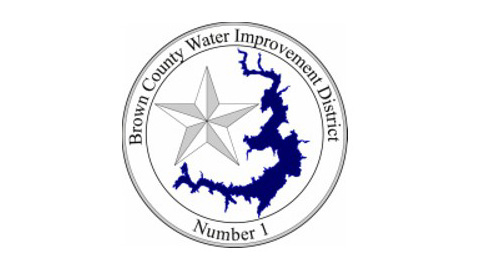
John Allen, General Manager of the Brown County Water Improvement District, dropped by KOXE Wednesday morning and spoke with Randy Turner on a variety of Lake Brownwood topics.
Regarding the Stage 1 Drought Contingency Plan that was recently activated, Allen said, “We hit that last week, which all that means is we’re in voluntary water restrictions at this point. We hit five foot low on Lake Brownwood and at that point we’re just asking everybody to conserve water if they can. Cut back where you can. If you are watering your grass, we ask that you do it in the evening hours or early in the morning. Watering in the heat of the day, you’re not doing a lot of good.”
As of Wednesday morning, Lake Brownwood was at 72.3 percent capacity, down from 98.1 percent capacity at this time a year ago. The lower lake level also creates additional safety concerns.
“When Lake Brownwood is full it’s about 6,500 acres. Now that were 5.5 foot low, we’re at 5,500 acres. We’re about 1,000 acres less in surface area, which is a lot,” Allen said. “As the lake goes down every day, there’s something new that shows up. We learned this really well back in 2011 when we went 17 foot low. We ask everybody that goes to Lake Brownwood to be cautious. You never know what you’re going to run into when you get out there. It is changing every day, different things stick up that weren’t there before as the size of the lake shrinks.”
Allen also addressed the zebra mussels issue at Lake Brownwood. Zebra mussels negatively impact ecosystems in many ways, such as filtering out algae that native species need for food, and they attach to – and incapacitate – native mussels. Zebra mussels must also be prevented from clogging water intakes.
“We do not have an estimate on how many there are, but they’re everywhere,” Allen said. “There is not one part of the lake where we haven’t found them at this point, but we have yet to find any massive clusters or thousands of them in one spot. That’s good, but it’s coming. Each adult female zebra mussel can have 1 million babies a year. Everything we’re told from inland fisheries as far as what’s going to happen is we’re going to reach a point where we get saturated with zebra mussels and then they’ll die back to a point. They’ll find a level they are able to sustain, and we don’t know that point.”
As for their origins in Lake Brownwood, Allen is not sure how they were introduced.
“Zebra mussel larvae can live on a boat trailer for 30 days out of water,” Allen said. “If that’s the case I can see boats or even birds being the reason. It seems like we were going to get them no matter what, it was just a matter of time.”
A zebra mussel mitigation project is underway, Allen said.
“We are continuing to work with our engineers, we have our 100 percent plans done and we’re reviewing them right now,” Allen said. “We’ll probably go out for bid sometime in August. We can’t cure them in Lake Brownwood, but what we can do is protect our infrastructure coming to town. We’ll be putting in a little injection system and tanks right at the dam to where we’ll inject a chemical into the pipeline to protect the pipeline and pumps and everything coming to town to keep the zebra mussels from building up in there.”
Allen added that zebra mussel can pose a danger to safety as well.
“I ask everyone to be careful out there,” Allen said. “The zebra mussels themselves are very sharp. I recommend wearing water shoes if you’re getting in and out of the water because they will cut your feet if you get into a patch of them. They attach to any hard surface, and we’ve even seen them attach to ropes. A lot of what we’re seeing is more plastic and rocks than anything else.”
Allen also addressed the recent announcement that the Brown County Water Improvement District is increasing water rates by 19.9% for the coming fiscal year.
“We worked really hard, I really want to give my department heads a shout out, and my board and budget committee for working on this,” Allen said. “We held the line as much as we can on everything, but as everybody knows if you go anywhere everything costs more these days.
“Our biggest single line increase was in our chemicals this year. Last year’s budget we had a little under $300,000 in the budget for chemicals and we have $700,000 this year. We have over $450,000 in July and August bills still to pay for chemicals this year, plus we have to add the chemicals for the zebra mussels next year. When you have one line item that doubles, it really hurts your budget.
Allen continued, “It’s not just the chemicals. Fuel, property insurance, and the trucking to get the chemicals here have all gone up. Getting anyone in to work on anything has almost doubled in price. We have zero capital expenses in the budget. We’re not buying anything new, we’re not purchasing any vehicles or equipment, we’re just maintaining what we have. We did not add any frills, it’s just a bare bones budget.”